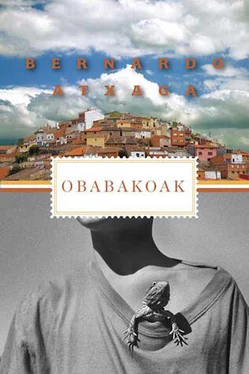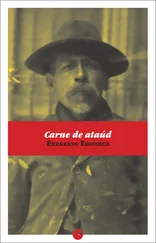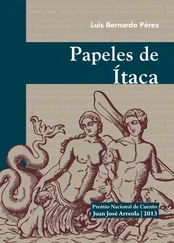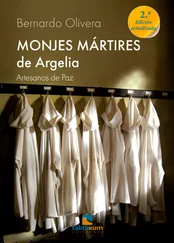Bernardo Atxaga - Obabakoak
Здесь есть возможность читать онлайн «Bernardo Atxaga - Obabakoak» весь текст электронной книги совершенно бесплатно (целиком полную версию без сокращений). В некоторых случаях можно слушать аудио, скачать через торрент в формате fb2 и присутствует краткое содержание. Год выпуска: 2010, Издательство: Graywolf Press, Жанр: Современная проза, на английском языке. Описание произведения, (предисловие) а так же отзывы посетителей доступны на портале библиотеки ЛибКат.
- Название:Obabakoak
- Автор:
- Издательство:Graywolf Press
- Жанр:
- Год:2010
- ISBN:нет данных
- Рейтинг книги:3 / 5. Голосов: 1
-
Избранное:Добавить в избранное
- Отзывы:
-
Ваша оценка:
- 60
- 1
- 2
- 3
- 4
- 5
Obabakoak: краткое содержание, описание и аннотация
Предлагаем к чтению аннотацию, описание, краткое содержание или предисловие (зависит от того, что написал сам автор книги «Obabakoak»). Если вы не нашли необходимую информацию о книге — напишите в комментариях, мы постараемся отыскать её.
Obabakoak
The Observer
Obabakoak — читать онлайн бесплатно полную книгу (весь текст) целиком
Ниже представлен текст книги, разбитый по страницам. Система сохранения места последней прочитанной страницы, позволяет с удобством читать онлайн бесплатно книгу «Obabakoak», без необходимости каждый раз заново искать на чём Вы остановились. Поставьте закладку, и сможете в любой момент перейти на страницу, на которой закончили чтение.
Интервал:
Закладка:
“I think you did very well,” replied the schoolmistress with a broad smile. She felt proud of the way the boy had acquitted himself.
“But I didn’t come here to tell tales, Miss. Like I said, there’s something I’m worried about.”
“Wait a minute, Manuel. First, I’m going to ask you a question. Have you had your supper?”
The boy shook his head.
“And have you noticed the good smell coming from the oven today?”
This time he nodded. It was impossible not to notice.
“There’s a cake in there. Have you ever had cake?”
“Twice.”
“Well, today will be the third time. But first we’re going to eat some other nice things. To start with, croquettes. Do you know what they are?”
“I think so,” said the servant, his eyes widening a little. Then he put his hand in his pocket and pulled out a fistful of cigarettes. “Would you like one?”
She was going to refuse, but the despair lodged in her heart rebelled against the negative. She was fed up with being what her mother called “a nice girl.” There was no point in being a nice girl. And she was, after all, celebrating her birthday and Manuel was keeping her company at the only party she was likely to have.
“I will have one, but after supper. First things first. And while we eat you can tell me what you’re worried about.”
“Well,” the boy began, not even touching the croquettes she set before him, “the thing is that next week I won’t be able to come to school because we’ve got masses of work to do at home. And I’m worried about the stove, because no one else knows how to light the fire and the school will just fill up with smoke, I know it will.”
“We’ll find a way around it, Manuel. Now eat up!”
But the servant boy didn’t move.
“Who’ll be in charge of lighting the fire while I’m away?” he asked, lowering his gaze. He was clearly afraid of losing his job.
“I’ll take charge of it myself in your absence, Manuel,” said the schoolmistress. At last she’d discovered the real source of the boy’s concern.
“What do you think?” she asked.
“Great! I think that’s a great idea!” he exclaimed, reaching out for his first croquette. Then, while they ate supper, he regaled the schoolmistress with stories of his life, talking with the candor, confidence, and joy of someone who sees their future as entirely unclouded. Where were his parents? No longer in this world, of course; they’d died when he was only three. And did he have any brothers? Yes, he had two brothers, much older than him, but he never saw them, they’d gone to America. What about sisters? No, no sisters, nor any need of them. What did he like doing? What he most liked doing in the world was wrestling, that and working as a shepherd with his dog. But more than anything else he liked wrestling. That was why, as soon as he could, he’d leave Albania and go somewhere where he could train seriously and get to be as good a wrestler as Ochoa.
“Where will you go, Manuel?” asked the schoolmistress, getting up to see to the cake.
“I don’t know yet, America probably, where my brothers are.”
Through the kitchen window they could see the moon submerged among the clouds. The sky had a reddish tinge to it.
“It’s started to rain,” said the young servant.
“I don’t like the rain. I like the snow,” she remarked, sniffing the cake and placing it on the table. It had turned out perfectly.
“Well, you’ll have to wait another two weeks for that. There won’t be any snow until then.” The boy spoke with the confidence of one who has often slept out in the open.
“I’ve got a little sherry, Manuel. Shall we have some with the cake?”
“If you like, Miss…”
“And don’t call me ‘Miss,’ Manuel. Forget I’m your teacher,” she said, going off in search of the bottle.
They ate their cake and drank the sherry as if performing a ceremony, in silence and very slowly, only occasionally laughing. Outside the wind and the rain joined forces to beat insistently at her window. But she and Manuel didn’t listen; they were aware only of the good cake and the good wine. The warmth of the kitchen protected them from all enemies.
“It’ll be Christmas soon, Manuel. Why don’t we sing a carol?” said the schoolmistress when they’d finished. The servant nodded.
They sang for a long time and then smoked and later drank some more. When the hermitage clock struck midnight, they were exhausted, especially the servant boy.
“I’m sorry, Miss, but I really must be going,” he said to the schoolmistress, forgetting what they’d decided earlier about forms of address. “I’ve been up since really early this morning and I can barely keep my eyes open.” He’d just given a few demonstrations of Ochoa’s famous back heel trip.
The schoolmistress — her third cigarette of the night in her hand — went over to the window before replying. The wind and the rain were still out there.
“You’ll have to stay here, Manuel. It’s a filthy night.”
The servant boy didn’t reply. He was falling asleep in his chair.
“I know what we’ll do. Do you see that mattress?”
“Why’ve you got a mattress in the kitchen?” asked the servant boy, opening his eyes.
“When it’s very cold I usually sleep in here. And that’s what you’re going to do tonight. It’s lovely sleeping in this kitchen. Come on now, don’t be silly, lie down.” The servant obeyed like an automaton.
As soon as the boy had lain down and closed his eyes, the schoolmistress’s Confused Heart began to protest. She was acting unwisely, or rather, she already had, by letting the party go on so long, by encouraging the boy to drink, and by drinking and smoking herself. She shouldn’t stand there looking down at that mattress, she should withdraw, go out and take a walk beneath the cold December rain and think it all through properly. But it was pointless. The voice with which the other forces of her inner self spoke was much stronger, more persuasive. She must not be a coward. The world was a long way from that kitchen. What did Albania matter, or her city by the coast, or anything? Anyway what was her hand doing? And was that hand perhaps wiser than Her Confused Heart?
The schoolmistress closed her eyes and took a deep breath. Then she went to her room.
“Settle down to sleep now, Manuel. I’ll be in to put out the light in a minute,” she shouted from the passage. The servant boy didn’t reply.
Standing in front of the big mirror in her room, the schoolmistress unzipped her skirt and let it fall to the floor. She liked her thighs. They were twenty-three years old today as well. They were strong and smooth, not flabby like her girlfriends’ thighs. When she walked along the beach lots of people turned to look at them.
Slowly, every part of her body was paraded before the mirror. Then, wearing only a summer nightdress, she tiptoed into the kitchen.
“Manuel, you’ve gone to sleep with your clothes on,” she said half-sitting, half-lying down by his side.
The day after her birthday, the fourth of December, the schoolmistress’s feelings had changed. The confusion that had filled her since her arrival in Albania had disappeared completely to be replaced by fear. She was no longer the woman of the Confused Heart; she was the woman of the Frightened Heart.
More than anything else that change affected the way she moved about Albania, because she no longer dared take her usual route home from school, instead — in order to avoid people’s eyes — she took the long way around: one hundred and twenty steps, then eighty, then seventy-five, and finally twenty-two, making — if my sums are correct — a total of two hundred and fifty-seven steps.
Читать дальшеИнтервал:
Закладка:
Похожие книги на «Obabakoak»
Представляем Вашему вниманию похожие книги на «Obabakoak» списком для выбора. Мы отобрали схожую по названию и смыслу литературу в надежде предоставить читателям больше вариантов отыскать новые, интересные, ещё непрочитанные произведения.
Обсуждение, отзывы о книге «Obabakoak» и просто собственные мнения читателей. Оставьте ваши комментарии, напишите, что Вы думаете о произведении, его смысле или главных героях. Укажите что конкретно понравилось, а что нет, и почему Вы так считаете.











